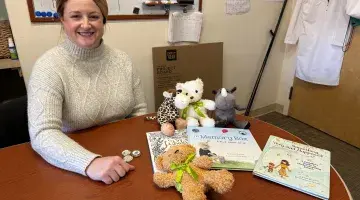A Closer Look at the Role of a Hospital Chaplain
Author

South Shore Health
Most people are familiar with the basic services hospitals provide to their patients and employees, including things like dining services, shuttle buses, and translations. But there’s one common hospital service that remains a bit mysterious: chaplaincy!
People have many preconceived notions about chaplains, assuming that all chaplains are priests or ministers, that chaplains want to convert patients to a new religion, or that chaplains sit in a patient’s room and pray.
We'd like to shed some light on the role of a chaplain in a modern hospital, while also dispelling some common misconceptions.
What does a hospital chaplain do?
The objective of a hospital chaplain isn’t to push any sort of religious agenda.
Instead, our goal is to come in with an open heart to sit and connect with people who may be going through tough times — regardless of their religious beliefs.
At South Shore Health, our chaplains are part of the Spiritual Care Department. The goal of the Spiritual Care Department is to provide non-denominational support for people with emotional triggers, grief, vulnerability, loss, or change in their lives.
Chaplains also provide services that help patients and their families through the journey of their loved one being in the hospital. Those services can be anything from helping a patient connect with a pastor from a home parish or arranging support services for a patient upon discharge.
In some cases, chaplains can serve as a kind of “go-between” for staff members, patients, and their families. We can give advice to clinicians on how to approach a patient who is having a tough time, or can follow up with a nurse at a family’s request.
Sometimes, the work done by chaplains can be even be celebratory in nature, as we’ve had chaplains perform weddings and baptisms at the hospital!
Do hospital chaplains visit every patient?
As part of our rounds, we make every effort to visit each patient in the hospital. We’ll also pay special visits to patients if a nurse or family member suggests that the patient could use our services. While we understand that some patients may not want to talk to us, we at least want to ensure that patients know our services are available to them.
People often wonder if it’s difficult to talk to patients in their hospital rooms, as they’re clearly going through a difficult time. It certainly can be difficult to connect with some patients, and for those who simply want peace and quiet, we respect their wishes.
However, for some, it takes nothing more than a simple conversation to get them to open up.
We ask where a patient is from, what the patient does for work, or even the first car the patient ever owned — simple things designed to get them talking. More often than not, conversations like that can lead to a patient opening up.
Are chaplain services only available to patients?
No! In the Spiritual Care department, we make sure our colleagues in the hospital know that our services are available to them as well.
Working in a stressful hospital environment can take a toll on your overall well-being, regardless of your role. Because our staff members care so much about our patients, being impacted by a patient’s journey and coping with his or her passing can be a difficult process.
After a particularly difficult case, colleagues may request that we visit with a fellow staff member who is having a difficult time. We do our best to provide that staff member with the emotional and spiritual support he or she needs to process grief and to focus on moving forward.
What are the best parts about being a hospital chaplain?
The most rewarding thing about being a chaplain is reaching patients and their families on a level that brings them closer to each other. In some instances, we help patients reconnect with estranged family members as they approach the end of their lives, allowing for healing and reconciliation.
To be allowed into a person’s life and develop a connection with them through existential thought is truly a privilege for a chaplain.
Chaplains are often thanked by patients who are grateful to have a listening ear, but the spiritual encounters we have with patients on a regular basis has a huge impact on us as well.
Author

South Shore Health






